90+ Copywriting Quote from The Greatest Copywriters of All Time
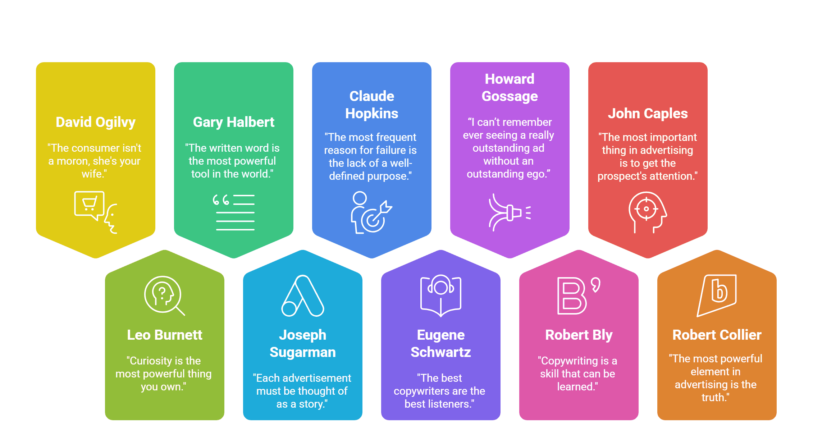
Have you ever hired a copywriter who promised the moon but delivered a pebble?
Or maybe you’re always staring at your website copy wondering why it’s not converting?
Trust me, you’re not alone.
As a business owner, getting your copy right can feel like throwing darts blindfolded – expensive and frustrating. It shouldn’t be.
For years, the greatest copywriters in history have released the secret to copywriting that sells.
But, you probably don’t have time to read the hundreds of books they’ve written. Who Does?
That’s why I’ve pulled together 90+ timeless copywriting quotes from the greatest minds in the business.
Armed with them, you’ll be able to:
- Tell what truly makes a persuasive copy.
- Communicate your vision effectively to your copywriter (when hiring one).
- And most importantly, avoid wasting money on mediocre copy.
And, if you are a writer, here’s your chance to stand on the shoulders of giants and put an end to writing copy that are wastelands of words.
In this article:
- What Are Copywriting Quotes?
- 10 Legendary Copywriters. 92+ Copywriting Quotes. Unlimited Lessons
- 1. David Ogilvy: The Father of Modern Advertising (1911-1999)
- 2. Claude Hopkins: The Pioneer of Scientific Advertising (1866-1932)
- 3. John Caples: The Headline Genius (1900-1990)
- 4. Robert Collier: The Father of Direct Mail Advertising (1885-1950)
- 5. Joseph Sugarman – The King of Direct-Response Tech Marketing (1938-2022)
- 6. Gary Halbert: The Prince of Print (1938-2007)
- 7. Eugene Schwartz: The Master of Long-Form Copy (1927-1995)
- 8. Leo Burnett: The Creator of Iconic Brand Characters (1891 – 1971)
- 9. Howard Gossage: Advertising’s most Articulate Critic (1917-1969)
- 10. Robert W. Bly: The Most Influential Copywriter of this Generation, (1957)
- Wrapping Up
What Are Copywriting Quotes?
Copywriting quotes are battle-tested snippets of advice from great copywriters.
They are simply the do’s and don’ts of copywriting condensed into bite-sized tips.
These quotes offer a glimpse into the thought processes of the greatest minds in the field and help you understand what works (and what doesn’t) when it comes to selling words.
Copywriting quotes offer you a shortcut to understanding the art and science of persuasion, without reading a library of books.
10 Legendary Copywriters. 92+ Copywriting Quotes. Unlimited Lessons
Unlike other articles you’ve seen, I’m not here to just throw copywriting quotes at you.
Here, you’ll learn about some of the best copywriters in history alongside their famous works.

1. David Ogilvy: The Father of Modern Advertising (1911-1999)
“The consumer isn’t a moron; she is your wife. You insult her intelligence if you assume that a mere slogan and a few vapid adjectives will persuade her to buy anything.”
David Ogilvy was a British advertising executive born in West Horsley, England.
After dropping out of Oxford, he tried his hand at various professions before finding his calling in advertising.
He worked as a chef in Paris, a farmer in Pennsylvania, and even a door-to-door stove salesman, where he discovered his talent for persuasive communication.
Ogilvy’s big break came when he started his agency, Ogilvy & Mather, in 1948. O&M’s early success with Rolls-Royce earned it major American ad accounts such as American Express and General Foods.
The agency would go on to create campaigns that turned unknown brands (Shell, Schweppes, Dove) into household names. By 1966, Ogilvy & Mather was one of the first advertising firms to go public.
Famous Work: 1957 Rolls-Royce Ad
“Advertising people who ignore research are as dangerous as generals who ignore decodes of enemy signals.”
The 1957 Rolls-Royce campaign was Ogilvy’s most famous campaign. The ad features the headline:
“At 60 miles an hour, the loudest noise in this new Rolls-Royce comes from the electric clock.”
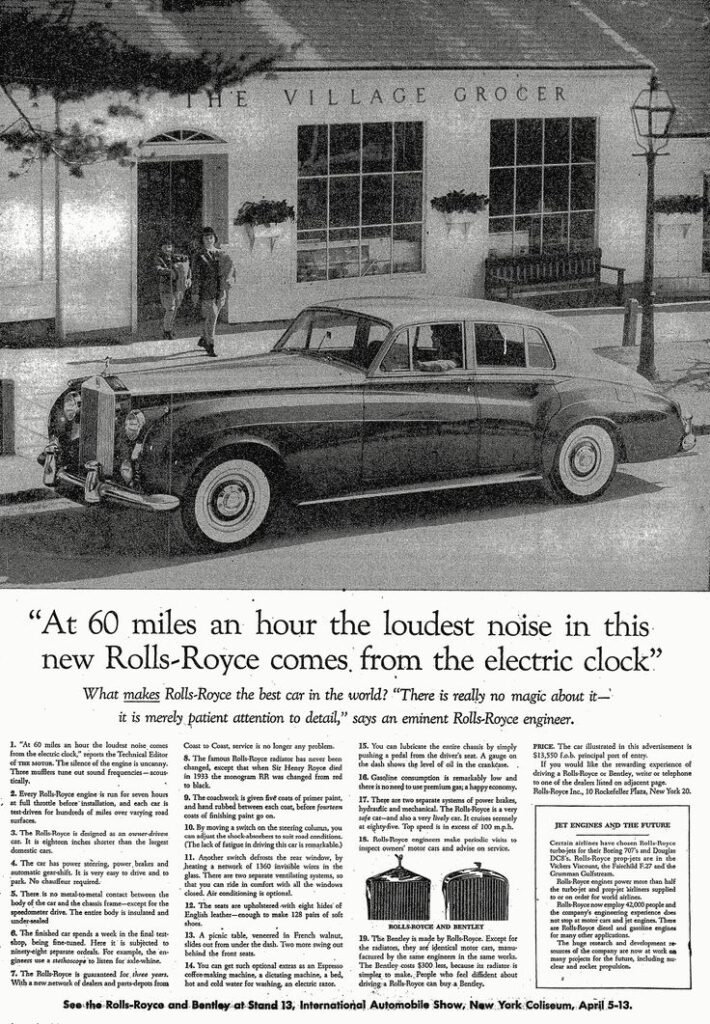
In his book, Confessions of an Advertising Man, Ogilvy revealed he spent 3 weeks researching Rolls-Royce to come up with the headline.
He spent days riding in the car, browsing manuals, and interviewing engineers to find one outstanding truth that would convince luxury ride seekers.
The ad which eventually ran for years boosted Rolls-Royce sales by 50% within weeks of its launch. The campaign solidified Rolls-Royce’s identity as a luxury car brand.
Throughout his life, and in his works, Ogilvy proved that to write great copy, you need great copywriting research skills.
David Ogilvy Copywriting Quotes
“Whenever you can, make the product itself the hero of your advertising. If you think the product is too dull, I have news for you: there are no dull products, only dull writers.”
- “On the average, five times as many people read the headline as read the body copy. When you have written your headline, you have spent eighty cents out of your dollar.”
2. “Consumers still buy products whose advertising promises them value for money, beauty, nutrition, relief from suffering, social status, and so on.”
3. “Advertisements with long copy convey the impression that you have something important to say, whether people read the copy or not.”
4. “Concentrate your time, your brains, and your advertising money on your successes. Back your winners, and abandon your losers.”
5. “I don’t believe in tricky advertising, I don’t believe in cute advertising, I don’t believe in comic advertising. The people who perpetrate that kind of advertising never had to sell anything in their lives.”

6. “When I write an advertisement, I don’t want you to tell me that you find it ‘creative.’ I want you to find it so interesting that you buy the product.”
7. “It takes a big idea to attract the attention of consumers and get them to buy your product. Unless your advertising contains a big idea, it will pass like a ship in the night. I doubt if more than one campaign in a hundred contains a big idea.”
8. “Our business is infested with idiots who try to impress by using pretentious jargon.” “The most important word in the vocabulary of advertising is TEST. If you pretest your product with consumers and pretest your advertising, you will do well in the marketplace.”
9. “Never write an advertisement which you wouldn’t want your family to read. You wouldn’t tell lies to your own wife. Don’t tell them to mine.”
2. Claude Hopkins: The Pioneer of Scientific Advertising (1866-1932)
“Remember, the people you address are selfish, as we all are. They care nothing about your interests or profit. They seek service for themselves. Ignoring this fact is a common mistake and a costly mistake in advertising.”
Imagine being so red-hot a copywriter that a company paid you $185,000 a year in 1907. That’s over $5 million in today’s money.
Claude Hopkins commanded this incredible figure for one simple reason; He could take any mundane product and sell transformative stories about it.
Hopkins was popular for bringing unknown products into the limelight and turning them into household names. (Quaker Oats, Goodyear Tires, The Bissell Carpet Sweeper, Van Camp’s Pork and Beans)
In 1930, he convinced Americans that a single bowl of Quaker Oats every morning could provide 24-hour long energy and vitality.
He created the 1917 campaign that took Palmolive from just another soap to a beauty treatment used by the Queen of the Ptolemaic Kingdom of Egypt, Cleopatra.
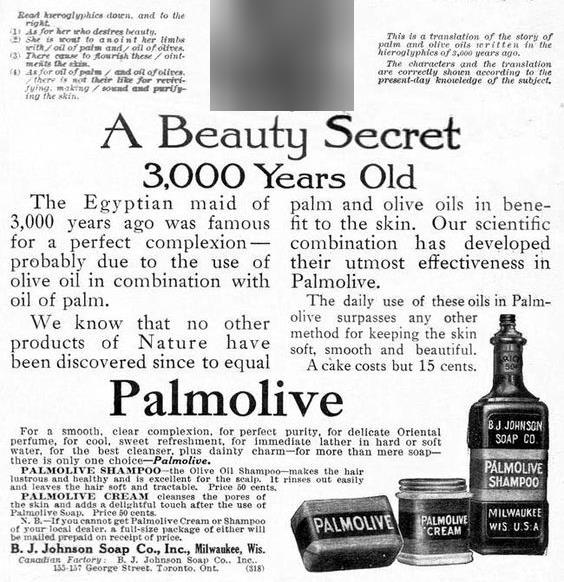
Born to a deeply religious family in Michigan, young Claude’s first taste of persuasion came from watching travelling preachers move crowds to tears and action.
While his mother had hoped he’d follow their path to the pulpit. Hopkins found his calling in what he called “the noblest form of public service” – advertising.
Famous Work: 1915 Pepsodent Launch Campaigner
“Best in the world,” “lowest price in existence, ” etc., are, at best, claiming the expected. But superlatives of that sort are usually damaging. They suggest looseness of expression, a tendency to exaggerate, and a careless truth. They lead readers to discount all the statements that you make.”
By the early 1900s, Hopkin’s name had become synonymous with viral ad marketing.
One day, a friend approached Hopkins to help with campaigns for his newly founded toothpaste, Pepsodent.
Then, toothbrushing was a rare habit amongst Americans with only 7% of the population using toothpaste.
After initial refusal, Hopkins agreed to work with him on a block of stock.
Using his signature technique, Hopkins linked Pepsodent to a beautiful smile.
He introduced the concept of “film on teeth”. This film rubs teeth of its whiteness and causes decay.
He then went on to position Pepsodent as the solution. The wording on his ad read:
“Just run your tongue across your teeth. You’ll feel a film – that’s what makes your teeth look ‘off-color’ and invites decay.”
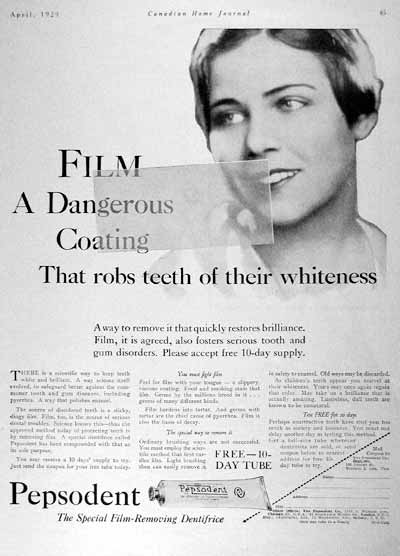
The ad further read:
“Note how many pretty teeth are seen everywhere. Millions are using a new method of teeth cleaning. Why should any woman have dingy film on her teeth? Pepsodent removes the film!”
Within five years, Pepsodent became the nation’s best-selling toothpaste and one of the most popular brands in the world.
And 10 years later, toothbrushing became a daily ritual for millions. Polls revealed that 65% of Americans had a tube of toothpaste in their medicine chests.
Hopkin is the author of Scientific Advertising (1923), the book Ogilvy claimed changed his life.
In his foreword for the book, Ogilvy wrote:
“Nobody should be allowed to have anything to do with advertising until he has read this book seven times. It changed the course of my life.”
Claude Hopkins Copywriting Quotes
“Ads are planned and written with some utterly wrong conception. They are written to please the seller. The interests of the buyer are forgotten.”

10. “Brilliant writing has no place in advertising…Never try to show off. You are selling your product, not yourself.”
11. “The product itself should be its own best salesman. Not the product alone, but the product plus a mental impression and atmosphere, which you place around it.”
12. “Some say, “Be very brief. People will read but little.” Would you say that to a salesman? With a prospect standing before him, would you confine him to any certain number of words? That would be an unthinkable handicap.”
13. “Ads are not written to entertain. When they do, those entertainment seekers are little likely to be the people whom you want. This is one of the greatest advertising faults. Ad writers abandon their part. They forget they are salesmen and try to be performers. Instead of sales, they seek applause.”
14. “None but those who regard advertising as some magic dreamland will ever try to sell without sampling.”
15. “The most effective thing I have ever found in advertising is the trend of the crowd. That is a factor not to be overlooked.
16. “In the same way, it is found that an offer limited to a certain class of people is far more effective than a general offer.”
17. “People are like sheep. They cannot judge values, nor can you and I. We judge things largely by others’ impressions, by popular favour.”
18. “Don’t, to gain general and useless attention, sacrifice the attention that you want.”
19. “The purpose of a headline is to pick out people you can interest. You wish to talk to someone in a crowd. So the first thing you say is, “Hey there, Bill Jones,” to get the right person’s attention. So it is in advertisement.”
3. John Caples: The Headline Genius (1900-1990)
“What good is all the painstaking work on a copy if the headline isn’t right? If the headline doesn’t stop people, the copy might as well be written in Greek.”
Caples wasn’t your typical Madison Avenue creative.
He was an engineer by training and a graduate of the U.S. Naval Academy whose interest in writing led him to join the Ruthrauff & Ryan agency in 1925.
Advertising, at that time, was often flowery and poetic, but Caples focused on direct appeals to the reader’s self-interest.
Over a career that spanned six decades, Caples worked with some of the biggest brands in the world, including General Electric, DuPont, and Reader’s Digest.
As evident in his works, Caples’ copywriting principle can be summarized into 3 simple points:
- Make it simple: If a 10-year-old can’t understand your ad, it’s too complicated.
- Focus on benefits, not features: People don’t buy drills—they buy holes in the wall.
- Test everything: Don’t guess what works. Know it.
Famous Work: 1926 Ad For U.S. School of Music
“Every single element in an advertisement – headline, subhead, photo, and copy – must be put there not because it looks good, not because it sounds good, but because testing has shown that it works best!”
In 1927, Caples penned what would become one of the most famous direct-response ads in history:
“They Laughed When I Sat Down at the Piano… But When I Started to Play!”
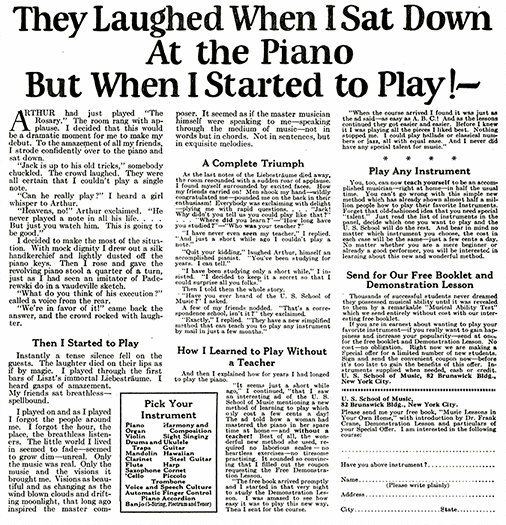
Despite being an ad for a piano correspondence course, Caples didn’t make it about ivory keys or music theory.
It was the tale of an underdog, Jack, who had mockers sing his praise through a simple piano course.
The ad used a conversational tone with a subtle emotional pull to create a compelling narrative that resonated deeply with readers.
Readers saw themselves in the story and connected with it in their thousands. Beyond sales, the campaign set a new standard for what a headline could achieve.
In his book, Tested Advertising Methods, Caples declared: “The difference between a good headline and a bad headline can be as much as 10 to 1 in results. Testing lets us know which is which.”
He would test up to 50 headlines for a single ad, meticulously tracking which ones pulled the strongest response.
Our friend, Lars Lofgren of Stone Cold Press, painstakingly put together a list of 35 headline formulas Caples taught in the book. Click the link to check them out.
John Caples Copywriting Quotes on Headline
“The most frequent reason for unsuccessful advertising is advertisers who are so full of their own accomplishments that they forget to tell us why we should buy.”
20. “The most frequent reason for unsuccessful advertising is advertisers who are so full of their own accomplishments (the world’s best seed!) that they forget to tell us why we should buy (the world’s best lawn!).”
21. “Avoid the “too smart” headline. Instead of making the readers want to buy, it simply makes them exclaim, “How clever!” WOMEN! READ THIS SUMMERY SUMMARY, …”
22. “Do not try to make your headline so short that it fails to express your idea properly. It’s more important to say what you want to say – even if it takes 20 words to do than make it short and fail to express your idea.”
23. “For every curiosity headline that succeeds in getting results, a dozen will fail.”
24. “In striving to produce an attractive headline, the copywriter should not emphasize the “quick, easy way” to such an extent that the headline becomes unbelievable.”
25. “The best headlines are those that appeal to the reader’s self-interest, that is, headlines based on reader benefits. They offer readers something they want – and get from you.”

26. “Remember that the reader’s attention is yours for only a single instant. They will not use up their valuable time trying to figure out what you mean.”
27. “You can write a 1st paragraph that continues the same thought you expressed in your headline. If you stop a reader with a headline about house paint, you can be sure of at least one thing about that reader: He wants more info about house paint. You will not lose him as long as you continue to give him what he wants.”
28. “Get the big point of your advertisement into your headline. Use your headline as a hook to reach out and catch the special group of people you are trying to interest.”
29. “Unsuccessful headlines were not written without a strong appeal, but it was the wrong appeal for that product and that audience.”
4. Robert Collier: The Father of Direct Mail Advertising (1885-1950)
“Before you put pen to paper before you ring for your stenographer, decide in your own mind what effect you want to produce on your reader — what feeling you must arouse in him.”
During the money-tight days of the Great Depression, when most Americans could barely afford bread, Robert Collier became a million-dollar copywriter through direct mail order.
Collier was born in St. Louis Missouri in 1855. Unlike many ad men who learned their craft in advertising agencies, Collier honed his skills by writing sales letters on his sickbed.
In 1906, Collier in his late 20s joined the family business, P.F. Collier & Son, a publishing house, as an assistant salesperson.
Shortly after, he was diagnosed with a terminal illness. Rather than succumbing to ill fate, Collier dedicated his time to studying human psychology, mental science, and self-development.
And from there, he forged his path to the peak of direct mail marketing. His kind of personal, almost hypnotic approach was irresistible.
Collier had a unique gift for what he called “joining the conversation already happening in your prospect’s mind.”
He would write like a friend sitting across the kitchen table from you, highlighting your fears and dreams, then gently showing you a path forward.
Famous Work: Robert Collier Letter Book, 1931
“There are only two reasons why your reader will do as you tell him to in your letter. The first is that you have made him want something so badly that of his own inertia, he reaches out for your order card to get it. The other is that you have aroused in him the fear that he will lose something worthwhile if he does not.”
At the depth of depression, many publishers shut down as people no longer buy books.
Others were slashing prices to stay in business. P.F. Collier & Son Publishing, on the other hand, thrived, and it all thanks to the copywriting genius of Collier.
Collier wrote a series of letters that sold millions worth of books. His famous, The Book of Life, pitched dreams and aspirations that readers can’t help but buy into.
In 1931, Collier published The Robert Collier Letter Book, a collection of his best sales letters along with insights into his techniques.
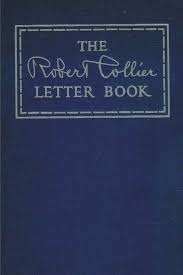
The book broke down the process of persuasion into simple, actionable steps. It emphasized principles such as:
- Meeting the prospect where they are: Collier believed in speaking to the reader’s current state of mind and addressing their immediate needs.
- Tapping into universal desires: He identified core human motivations like the desire for wealth, health, love, and security.
- Storytelling with a purpose: Collier’s letters often told relatable stories that made the reader feel part of a shared experience.
Robert Collier Copywriting Quotes
“We have become so accustomed to hearing everyone claim that his product is the best in the world, or the cheapest, that we take all such statements with a grain of salt.”
30. “You have to compete in the same way for your reader’s attention. He is not looking for your letter. He has a thousand and one other things more important to him to occupy his mind. Why should he divert his attention from them to plow through pages of type about you or your projects?”
31. “The headline of an advertisement accounts for 60% of the pull of that ad. In the same way, the start of a letter makes or breaks the letter because if the start does not interest your reader, he never gets down to the rest of your letter.”
32. “Study your reader first – your product second. If you understand his reactions and present those phases of your product that relate to his needs, then you cannot help but write a good letter.”

33. “You know that every man is constantly holding a mental conversation with himself, the burden of which is his own interests — his business, his loved ones, his advancement. And you have tried to chime in on that conversation with something that fits in with his thoughts.”
34. “Make every thought, every fact, that comes into your mind pay you a profit. Make it work and produce for you. Think of things not as they are but as they might be. Don’t merely dream — but create!”
35. “Finally, tell him what to do. Don’t leave it to him to decide. We are all mentally lazy, you know, so dictate his action for him — get your suggester to work on him. If he is to do certain things, describe them. Tell him to put his name on the enclosed card, stamp, and mail, or pin his check or dollar bill to this letter and return it in the enclosed envelope.”
5. Joseph Sugarman – The King of Direct-Response Tech Marketing (1938-2022)
“The ideas presented in your copy should flow in a logical fashion, anticipating your prospect’s questions and answering them as if the questions were asked face-to-face.”
Joseph Sugarman was an American copywriter and entrepreneur who started a mail order agency JS&A (Joseph Sugarman & Associates) by writing ads by hand.
He’s the author of The Adweek Copywriting Handbook, one of the most practical books I’ve ever read as a copywriter.
With his background in electrical engineering, Sugarman was popular for explaining complex technological products so simply that customers couldn’t help but pull out their credit cards.
When digital watches were new and mysterious, Sugarman’s ads made them irresistible. When calculators cost hundreds of dollars, his copy made them fly off the shelves.
This adman has loads of amazing feats testifying to his copywriting prowess. Here are some:
- He sold a used airplane valued at $190,000 for $240,000 through a single magazine ad.
- He once offered $10 to anyone who found a spelling error in his ads. A clever tactic to draw attention to his copy and encourage people to read it religiously.
- Sugarman was one of the first advertisers to use toll-free numbers to accept credit card orders over the phone.
- He wrote an ad that sold an entire inventory of a smoke detector despite being 6 times more expensive than competitors. The ad created such high demand that the manufacturer struggled to keep up with orders.
Sugarman later said this campaign taught him that price is only an issue in the absence of value.
If you can make people truly understand and feel the value, they’ll pay premium prices even for commodity products.
Famous Work: BluBlocker Sunglasses Campaign, 1986
“Every great ad is a story, and every story has the power to change someone’s life.”
One of Joseph Sugarman’s greatest marketing triumphs was making BluBlocker Sunglasses a multi-million-dollar brand.
The ad was the first in the campaign that turned BluBlocker sunglasses from a weird aviation technology into a cultural phenomenon that sold over 20 million pairs.
Instead of writing a typical sales pitch, Sugarman started with a first-person story about his experience wearing BluBlockers for the first time.
With that, he built curiosity and excitement that made readers feel like they were missing out on something magical.
Here’s the complete ad;
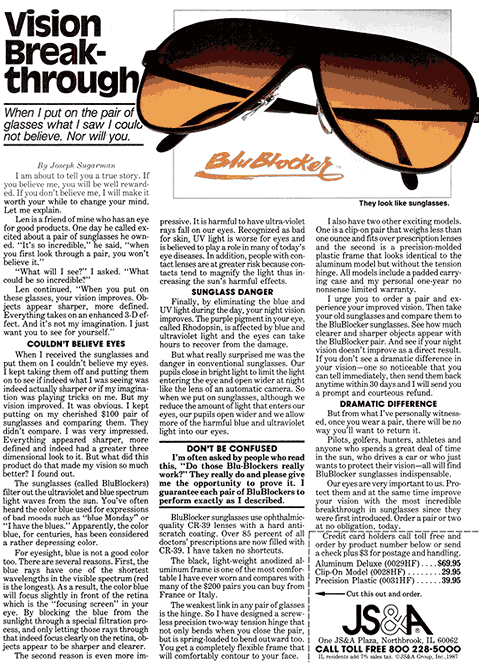
In all his work, Sugarman shows that selling is all about great storytelling.
You must be able to create such a compelling story that customers thank you for the opportunity to buy.
And as he famously said, “Every product has a story. Your job is to find it and tell it.”
Joseph Sugarman Copywriting Quotes
“Copywriting is a mental process, the successful execution of which reflects the sum total of all your experiences, your specific knowledge, and your ability to mentally process that information and transfer it onto a sheet of paper for the purpose of selling a product or service.
36. “Every communication should be a personal one, from the writer to the recipient, regardless of the medium used.”
36. “Get the reader to say yes and harmonize with your accurate and truthful statements while reading your copy.”
38. “The prospect has basic emotional needs that your product will solve, regardless of how sophisticated or simple your product offering is. Examine those emotional needs.”
39. “So your first sentence should be very compelling by virtue of its short length and ease of reading. No long multisyllabic words. Keep it short, sweet, and almost incomplete so that the reader has to read the next sentence.”
40. “All the elements in an advertisement are primarily designed to do one thing and one thing only: get you to read the first sentence of the copy.”
41. “You must become an expert on a product, service, or anything you write about to really be effective.”

42. “Sometimes changing a single word will increase response in an ad. John Caples, the legendary direct marketer, changed the word repair to the word fix and saw a 20 percent increase in response.
43. “Your readers should be so compelled to read your copy that they cannot stop reading until they read all of it as if sliding down a slippery slide.”
44. “Telling a story can effectively sell your product, create the environment, or get the reader well into your copy as you create an emotional bonding with your prospect.”
45. “Never sell a product or service. Sell a concept.”
46. “Copy Should be long enough to cause the reader to take the action that you request.”
6. Gary Halbert: The Prince of Print (1938-2007)
“The most important thing is a hungry market. Not a brilliant burger.”“Be careful. You want to know what people actually DO buy, not what they SAY they buy.”
If there was ever a copywriter who never lived life as colorful as he wrote, it was Gary Halbert.
Gary Halbert was one of the most influential direct-response copywriters of all time. He’s popular for his raw, no-nonsense writing style.
He wrote sales letters, direct mail, and print ads that generated millions in revenue. But his early life was filled with seemingly unsurmountable challenges.
At his lowest point, Gary was left alone in a small apartment. His wife had taken their children and left him, and he was living without electricity, water, or food.
Despite this, Gary kept writing and testing, chasing the secret formula for successful copywriting.
And that secret finally came to him and changed everything. In his own words: “You are just one great sales letter away from changing your life.”
Halbert understands that who you sell to matters more than what you’re selling.
His mantra was that the most important element of marketing success is the “starving crowd”.
This means finding a market that desperately wants what you’re selling, rather than trying to convince an uninterested market to buy.
And this mantra was instrumental to his breakthrough.
Famous Work: The $109.5M Coat of Arms Direct Mail Letter, 1971
“If your prospect gets an instant ‘lift’ from just looking at your ad, then he will start reading it and looking for reasons to convince himself that the promise of your ad is true!”
Till today, the Coat of Arms Letter is one of the most profitable direct mail campaigns ever.
Halbert wrote a personalized direct mail letter offering people a print version of their family’s coat of arms.
Unlike the generic “Dear Friend” put on all sales letters at that time, Halbert’s letter used the recipient’s family name.
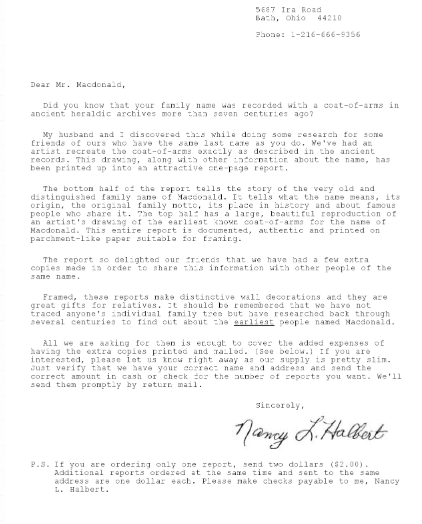
This personalization created an emotional connection that made the recipient feel seen and valued.
Besides, people are innately curious about their family history. Who wouldn’t fancy a personalized print of their family’s coat of arms?
It was indeed a starving crowd and the results were staggering:
- The campaign generated $360,000 in daily revenue, totalling over $109.5 million a year.
- It achieved an unheard-of 10% conversion rate. The letter was generating more first-class mail than any other single advertiser in the country, including major credit card companies.
- At its peak, the campaign was processing 20,000 orders a day and employed 700 people to handle the demand.
- In the 1980s, Gary Halbert was convicted of mail fraud charges.
While serving time in Boron Federal Prison, Halbert wrote a series of handwritten letters to his son, Bond Halbert, teaching him the fundamentals of persuasion, direct marketing, and life in general.
These became known as The Boron Letters. Here’s a snippet from Chapter 1 of the letters:
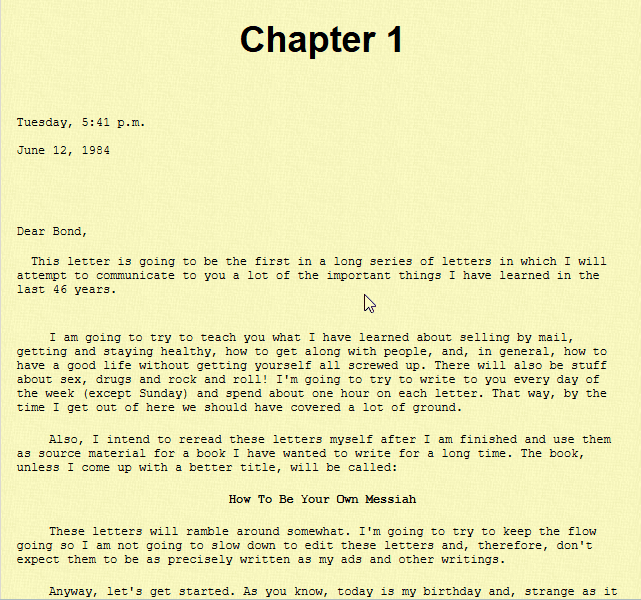
You can find the complete 25 chapters of The Boron Letters here.
Gary Halbert Copywriting Quotes
47. “What you really want is for the reader to order from your ad. Listen up, dummy, If you are writing for applause… you will go home with empty pockets.”
48. “Do you know what is the most often missing ingredient in a sales message? It’s the sales message doesn’t tell an interesting story.”
49. “What happens when you read your copy out loud is that you will verbally stumble over all the places that are not smooth…”
50. “Get yourself a collection of good ads and direct mail pieces and read them aloud and copy them in your own handwriting.”
51. “Constantly be on the lookout for groups of people (markets) who have demonstrated that they are starving (or at least hungry!) for some particular product or service.”

52. “Fight any urge to sound like a cliché and use phrases which a reader could finish on their own.”
53. “I’m the last guy to ask for advice on how to have a successful copywriting business. I’m not in the copywriting business. I’m in the self-aggrandizement business.”
54. “It has long been my belief that a lot of money can be made by making offers to people who are at an emotional turning point in their lives. For example, when they have just had a baby, just gotten married, just lost a loved one, just gotten a raise, just filed bankruptcy, just purchased a new car, and so on.”
55. “Use simple, common, everyday words. Use ‘get’ instead of ‘procure’. Write short sentences and short paragraphs. Use ‘transition’ words and phrases to make your writing flow smoothly.”
7. Eugene Schwartz: The Master of Long-Form Copy (1927-1995)
“No sentence can be effective if it contains facts alone. It must also contain emotion, image, logic, and promise.”
Eugene Schwartz posed an unmatched record in the advertising world. He had more winning ads than perhaps any other copywriter in history.
For every $1 his client spent, he made them 0.85 cents in return. That’s a hit ratio of 85%.
Born in Butte, Montana, Schwartz was a copywriter, author, and marketing pioneer known for writing some of the most iconic lines in direct-mail advertising. He wrote:
- “Give Me 15 Minutes and I’ll Give You a Super-Power Memory,”
- Do You Have The Courage To Earn Half A Million Dollars a Year
- An Automatic Income For Life of $20,000…$50,000…$100,000 a Year Without Working…from a Business That Runs Itself
- Break All The Rules And Win A 35 Year Old Body at 50-60-70-and Beyond
- Why Models Stay Young Till Sixty
Schwartz studied at the University of Washington before moving to New York City in 1949, where he began as a messenger at Huber Hoge & Sons and rose to the position of copy chief.
And by 1954, he had become the president of his own million-dollar mail-order advertising firm.
Famous Work: Boardroom Report Launcher, 1976
“Copy is not written. If anyone tells you ‘you write copy,’ sneer at them. Copy is not written. Copy is assembled. You do not write copy. You assemble it. You are working with a series of building blocks, you are putting the building blocks together, and then you are putting them in certain structures, you are building a little city of desire for your person to come and live in.”
Eugene Schwartz’s advertising campaigns achieved remarkable financial success.
He wrote over 200 winning ads which often make it difficult to pick the most successful ones.
But going the popularity way, here are 2 of his amazing works:
Schwartz helped Rodale Press sell millions of health and self-help book sales in 1970.
In one instance, he wrote an ad that sold 1.98 million copies of a single $25 book, which generated nearly $50 million in revenue.

He also created the campaign that launched Boardroom Reports, a direct-response company in 1976.
His headline for that copy was:
“Read 300 Business Magazines in 30 Minutes.”
Starting with just $3,500, the company rapidly grew to annual sales of over $50 million.
Over his career, Schwartz authored 10 books, including the seminal Breakthrough Advertising and The Brilliance Breakthrough.
Eugene Schwartz Copywriting Quotes
“Copy cannot create desire for a product. It can only take the hopes, dreams, fears, and desires that already exist in the hearts of millions of people and focus those already existing desires onto a particular product.”
56. “There is your audience, There is the language, There are the words that they use.
Eugene Schwartz
57. “The arts not only imbue our sense of sight, balance, movement, touch, and hearing, they also lift our logical minds – the traditional focus of modern education – into the reaches of possibility, invention, and genius.”
58. “Breakthrough Advertising is not about building better mousetraps. It is, however, about building larger mice – and then building a terrifying fear of them in your customers.”

59. “Facts are boring. The audience needs to feel invested. It must invoke emotions in the audience. There must be interesting imagery, emotions, and logic also present.”
60. “The greatest mistake marketers make is trying to create demand.”
61. “Let’s get to the heart of the matter. The power, the force, the overwhelming urge to own that makes advertising work comes from the market itself, and not from the copy.”
67. “This is the copywriter’s task: not to create this mass desire – but to channel and direct it.”
8. Leo Burnett: The Creator of Iconic Brand Characters (1891 – 1971)
“Rarely have I seen any really great advertising created without a certain amount of confusion, throw-aways, bent noses, irritation, and downright cursedness.
From the wholesome charm of the Jolly Green Giant to the rugged allure of the Marlboro Man, Leo Burnett is known for character-based advertising.
His genius lay in transforming products into personalities, giving brands a soul and a story that customers could connect with on a deeply personal level.
Burnett studied journalism at the University of Michigan and graduated in 1914.
He initially worked as a journalist before transitioning to advertising, where his knack for storytelling and understanding consumer psychology quickly set him apart.
In 1935, during the height of the Great Depression, Leo Burnett started his Company in Chicago with a starting capital of $50,000.
The agency became popular for creating some of the most enduring brand mascots the world has ever seen.
Famous Work: The Marlboro Man, 1954
“The secret of all effective originality in advertising is not the creation of new and tricky words and pictures, but one of putting familiar words and pictures into new relationships.”
Over his illustrious career, Burnett created a portfolio of iconic brand mascots that later became household names.
The Marlboro Man campaign launched in 1954 stands as perhaps his most transformative creation.
At the time, Marlboro cigarettes were marketed towards women, but the company wanted to expand its market to men.
Leo Burnett created the rugged cowboy image imagery of the Marlboro Man to combat the feminine reputation.

The ad used minimal copy. It features rugged cowboys in natural settings, embodying an idealized version of the American West.
The result? Within a year, Marlboro, a relatively unknown brand became the best-selling cigarette in America and soon the world’s best-selling cigarette brand.
The campaign also had a significant impact on American culture. The Marlboro Man became a symbol of the rugged individualism and the American West.
His other memorable character is Tony the Tiger, the mascot he created for Kellogg’s Frosted Flakes cereal.
The campaign had a lasting impression. Its catchphrase, “They’re GR-R-REAT!” became a sensation among young and old.
Tony became a symbol of energy and enthusiasm that people could recognize even without Kellogg’s branding.
Leo Burnett believed in creating “advertising that sells with warmth, charm, and human appeal.”
His campaigns focused on the inherent drama of products, finding the unique emotional core that would capture consumer attention.
The success of his character-driven campaigns shows that when advertising connects with people on an emotional level, it can create brand equity that lasts for generations.
Leo Burnett’s Copywriting Quotes

“If you are writing about baloney, don’t try to make it Cornish hen because that is the worst kind of baloney there is. Just make it darned good, baloney.
68. “If you can’t turn yourself into your customer, you probably shouldn’t be in the ad writing business at all.”
69. Anyone who thinks that people can be fooled or pushed around has an inaccurate and pretty low estimate of people – and he won’t do very well in advertising.
Leo Burnett
70. “I am one who believes that one of the greatest dangers of advertising is not that of misleading people but that of boring them to death.”
71. “Advertising is the ability to sense, interpret… to put the very heart throbs of a business into type, paper, and ink.
72. “The greatest thing to be achieved in advertising, in my opinion, is believability, and nothing is more believable than the product itself.”
73. “Advertising says to people, ‘Here’s what we’ve got. Here’s what it will do for you. Here’s how to get it.’
74. “We want consumers to say, ‘That’s a hell of a product’ instead of, ‘That’s a hell of an ad.”
75. “Make it simple. Make it memorable. Make it inviting to look at. Make it fun to read.”
76. “Regardless of the moral issue, dishonesty in advertising has proved very unprofitable.
9. Howard Gossage: Advertising’s most Articulate Critic (1917-1969)
“To explain responsibility to advertising men is like trying to convince an eight-year-old that sexual intercourse is more fun than a chocolate ice cream cone.”
Interactive advertising is commonplace in marketing today. It wasn’t in the 60s.
Then, ads were majorly in print. Gossage found a way to make this traditional media interactive.
Popularly called “The Socrates of San Francisco”, Howard Gossage, was an eccentric 1960s ad-man who operated his agency from a quirky converted firehouse.
To Gossage, the job of an ad was not merely to demand attention but to earn it by providing value, whether through humor, wit, or engagement.
He likened ads to stories or movies, emphasizing that if interesting, people will engage with it willingly—and once is enough to make an impression.
Gossage advocated for advertising that added value to people’s lives through entertainment, engagement, or education.
He rejected the prevalent “sell at all costs” mentality, a perspective that led David Ogilvy to dub him “Advertising’s most articulate critic.”
Famous Work: Australia’s Qantas Airlines Ads, 1958
“I don’t know how to speak to everybody, only to somebody.”
Gossage’s innovative approach to copywriting is perfectly exemplified in his famous Qantas Airlines campaign.
“Be the first one in your block to win a Kangaroo.”

Rather than creating conventional airline advertisements focused on destinations or service quality. You know, the regular “Fly with us” ad.
He turned the advertisement into a game, inviting readers to “Be the first one in your block to win a Kangaroo.”
The ad included a cut-out form where readers could suggest names for the airline’s fleet. People could tear it, fill and send it back.
A Few weeks later, he followed it with another clever ad announcing the winning name “SAM”.
The follow-up ad used a similar playful tone while gently poking fun at their competitor, TWA. (Read the full story here)
His ads were proof that you don’t have to scream for attention when you can earn it with creativity and wit.
Howard Gossage Copywriting Quotes
“I can’t remember ever seeing a really outstanding ad that couldn’t be traced to an outstanding ego.”
77. “Is advertising worth saving? Yes, if we can learn to look at advertising not as a means for filling so much space and time but as a technique for solving problems.”
78. “The object of your advertising should not be to communicate with your consumers or your prospects at all but to terrorize your competition’s copywriters.”
79. “Advertising justifies its existence when used in the public interest- it is much too powerful a tool to use solely for commercial purposes.”

80. “How often do you have to read a book, a news story, or see a movie or play? If it is interesting, once is enough; if it is dull, once is plenty.”
81. “The real fact of the matter is that nobody reads ads. People read what interests them, and sometimes it’s an ad.”
82. “Our first duty is not to the old sales curve. It is to the audience.”
83. “When advertising talks about the audience, it doesn’t mean its audience. It means somebody else’s, gathered there to watch or read something else.”
10. Robert W. Bly: The Most Influential Copywriter of this Generation, (1957)
“Clever advertising can convince people to try a bad product once. But it can’t convince them to buy a product they’ve already tried and didn’t like.”
Robert W. Bly is arguably the most influential figure in modern copywriting and direct response marketing.
Bly grew up in Fair Lawn, New Jersey. He started his writing career at the University of Rochester’s daily newspaper. He then worked as a corporate writer for Westinghouse Electric.
Since launching his copywriting business in 1982, Bly has worked with over 100 clients including top brands like IBM, AT&T, Praxair, Intuit, and Forbes.
Unlike many who treat copywriting as purely creative, Bly popularized several frameworks for writing effective copy.
He prophesied the concept of “Power Words” (specific terms that trigger emotional responses and drive action) in copywriting.
His “4-U” (Urgent, Unique, Ultra-specific, and Useful) approach to headline writing has become a standard tool in many copywriters’ arsenals.
Famous Work: The Copywriter’s Handbook, 1985
“The words in your copy should be “like the windows in a storefront. The reader should be able to see right through them and see the product.”
Bly’s impact on the field comes through his extensive teaching and training.
In 1985, at the age of 27, he published The Copywriter’s Handbook, which became a widely acclaimed resource for copywriters and business folks alike.
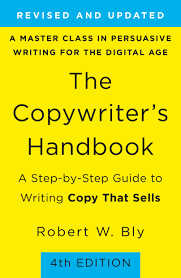
Today, he has over 100 books on copywriting, marketing, and freelance writing.
Through his books, seminars, and courses, Bly always shows that effective copywriting isn’t magic. It’s a learnable skill based on proven principles and hard work.
Robert W. Bly Copywriting Quotes
“The surest way to arouse and hold the attention of the reader is by being specific, definite, and concrete.”
85. “We are not in the business of being original. We are in the business of reusing things that work.”
86. “To sell, your copy must get attention . . . hook the reader’s interest . . . create a desire for the product . . . prove the product’s superiority . . . and ask for action.”
87. “Avoid pompous words and fancy phrases.”
88. “Grade your performance as a copywriter on sales generated by your copy, not on originality.”
89. “Consumers are exposed to more than twice as many ads today as fifteen years ago, but pay attention to only 20 percent more.”

90. “People use big words to impress others, but they rarely do. More often, big words annoy and distract the reader from what the writer is trying to say.”
91. “Instead of creating aesthetically pleasing prose, you have to dig into a product or service, uncover the reasons why consumers would want to buy the product, and present those sales arguments in copy that is read, understood, and reacted to—copy that makes the arguments so convincingly the customer can’t help but want to buy the product being advertised.”
92. “Experienced copywriters turn those features into customer benefits: reasons why the reader should buy the product.”
Wrapping Up
Whether you’re hiring your next copywriter or taking a stab at writing yourself, these nuggets of wisdom from advertising legends should help.
Of course, reading copywriting quotes won’t make you an expert in a lift. But, it would at least make you an informed copy critic.
But if you still feel like you need help with your business copy (emails, web copy, blog content, landing page, product description, etc.), you can contact me at email: [email protected] or schedule a free consultation call here.


